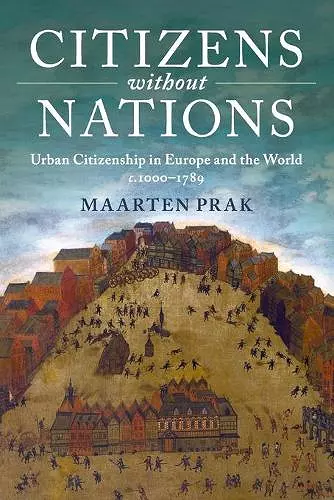Citizens without Nations
Urban Citizenship in Europe and the World, c.1000–1789
Format:Paperback
Publisher:Cambridge University Press
Published:16th Aug '18
Currently unavailable, and unfortunately no date known when it will be back
This paperback is available in another edition too:
- Hardback£76.50was £85.00(9781107104037)

Examines how urban citizenship gave many people a real stake in their own communities, even before the rise of modern democracy.
An ambitious study of the historical roots, development and role of citizenship during the period from the late Middle Ages to the French Revolution. Citizenship is shown to be not just an exclusively European institution, but one that could be traced to China, the Middle East and the American colonies.Citizenship is at the heart of our contemporary world but it is a particular vision of national citizenship forged in the French Revolution. In Citizens without Nations, Maarten Prak recovers the much longer tradition of urban citizenship across the medieval and early modern world. Ranging from Europe and the American colonies to China and the Middle East, he reveals how the role of 'ordinary people' in urban politics has been systematically underestimated and how civic institutions such as neighbourhood associations, craft guilds, confraternities and civic militias helped shape local and state politics. By destroying this local form of citizenship, the French Revolution initially made Europe less, rather than more democratic. Understanding citizenship's longer-term history allows us to change the way we conceive of its future, rethink what it is that makes some societies more successful than others, and whether there are fundamental differences between European and non-European societies.
'A profoundly original book. Prak shows how much of what historians and social scientists think they know about citizenship and the rise of democratic politics is simply wrong. Uncovering the errors that have blinded so many, he proceeds to construct a historically grounded foundation for a new understanding of the meaning of citizenship that instructs us about the past and the present.' Jan de Vries, University of California, Berkeley
'This is a major contribution to emancipating citizenship from the nation. Tracing varieties of citizenship before its invention as nationality, Prak makes a compelling case for understanding citizenship as a practical activity without binary oppositions: European versus non-European, urban versus rural, or national versus international. The result is a riveting narrative, forcefully inviting us to think differently and historically about citizenship.' Engin Isin, Queen Mary University of London
'This is a large, richly researched, provocative study which repositions the pre-modern city, its citizens and agencies, at the centre of the European political stage. It is a brilliant exemplar of the New Urban History, setting European developments in a broad global perspective.' Peter Clark, University of Helsinki
'In this wide ranging and bold book, Maarten Prak offers a penetrating analysis of urban citizenship in pre-modern Europe. He both revises a Weberian narrative about the distinctiveness of western European civic institutions in comparison to those in Asia and the Americas and undoes assumptions about the superiority of national citizenship post-1789.' Martha Howell, Columbia University, New York
'The book is based on a lifetime of research in urban history, and the material is presented with clarity, concision, and enormous authority.' Christopher R. Friedrichs, The American Historical Review
ISBN: 9781107504158
Dimensions: 223mm x 152mm x 20mm
Weight: 720g
442 pages